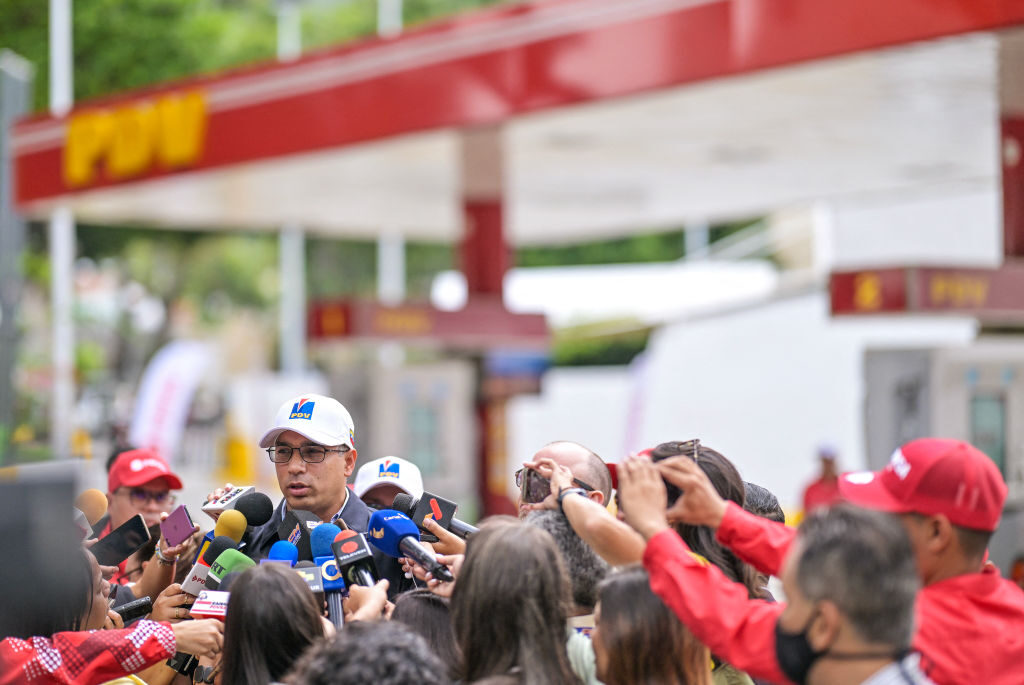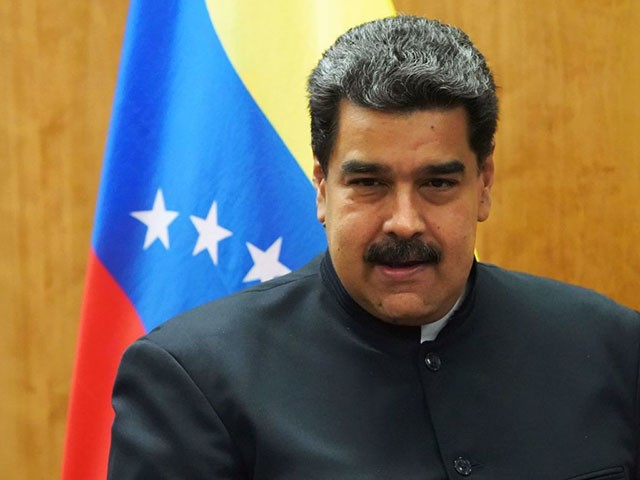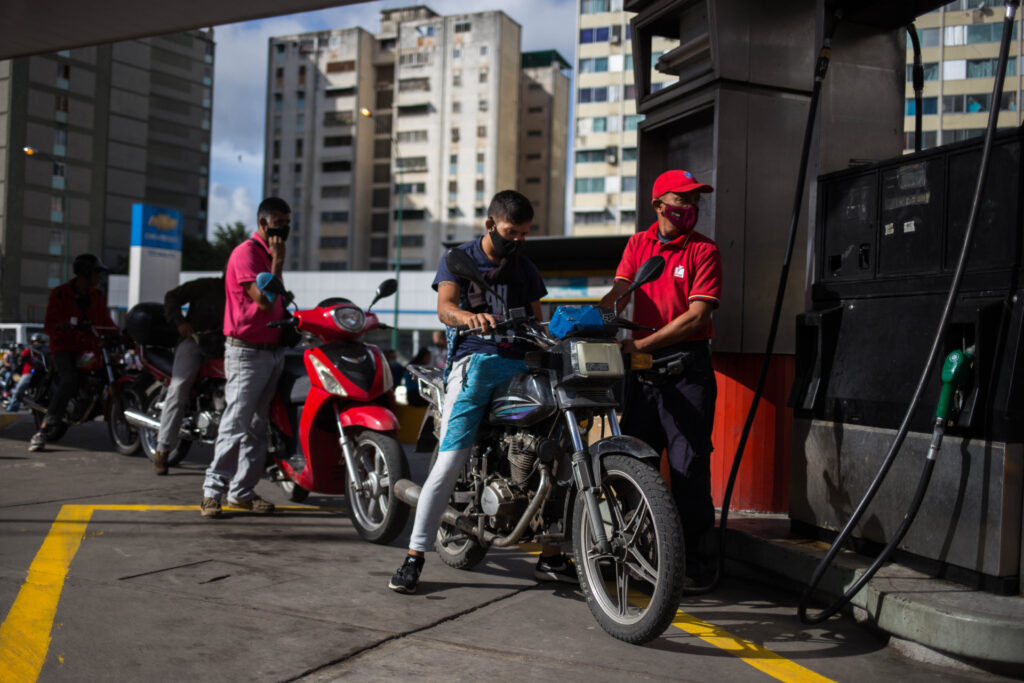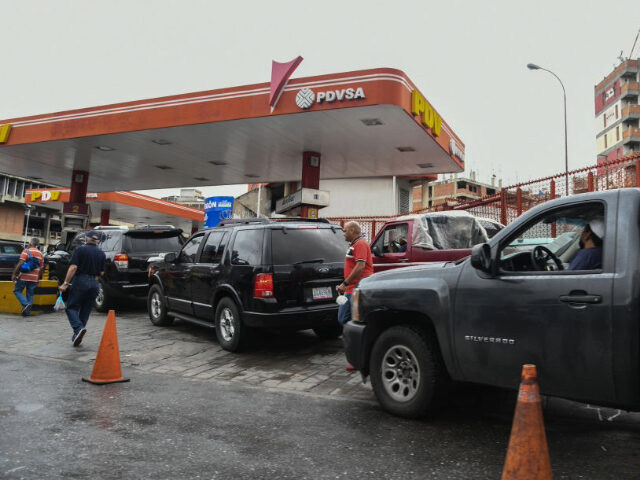Venezuelan citizens will soon have to book appointments to buy subsidized fuel rations for their vehicles, Oil Minister Pedro Tellechea announced.
Tellechea explained to reporters that Venezuelans will have to make their appointments to receive cheap fuel through a yet-to-be-launched mobile phone application that the socialist regime is planning to release “over the next days” in an effort to shorten the massive fuel lines common throughout the South American nation in recent years. The oil minister made the announcement during the launch of a pilot “fast-payment” Chinese-made oil dispenser in Caracas.
“[For] the person who has the subsidy, which we have already channeled and studied, in the coming days, we will create an application for people to have the possibility of this,” Tellechea said.

Venezuelan Oil Minister and President of the Venezuelan state oil company PDVSA Pedro Tellechea talks to the media at a petrol station in Caracas on June 14, 2024. (JUAN BARRETO/AFP via Getty Images)
Venezuela, an oil powerhouse brought to ruin by socialism, holds the world’s largest proven oil reserves, estimated at more than 300 billion barrels. For more than a decade, nationwide fuel shortages have led to Venezuelans facing severe difficulties in accessing fuel in recent years after more than two decades of socialist mismanagement left the nation’s state oil company, PDVSA, and its infrastructure on the brink of total ruin.
Since the early 2010s, dictator Nicolás Maduro has implemented several often convoluted plans to ration fuel distribution, ranging from now-phased-out “ration chips” installed on vehicles in the state of Zulia in 2012 to raffles by local socialists in the state of Merida in 2023 to see who “wins” refuel quotas. Maduro also used the Chinese social-credit-score-inspired Fatherland platform to assign monthly subsidized fuel rations to people linked by the platform to a specific citizen and his or her vehicle.

Venezuelan dictator Nicolás Maduro (DON EMMERT/AFP via Getty Images)
The Maduro regime, which controls all fuel distribution in Venezuela through PDVSA, has sold fuel in Venezuela in two ways since 2020.
The first method, the “subsidized” one, sees the socialist regime distribute 120 liters (31.7 gallons) of highly subsidized fuel per month at a highly subsidized rate of roughly $0.02 per liter. To receive the subsidy, users must register themselves and their vehicles on the Fatherland platform and can only refuel on specific days of the week based on the last number of their vehicle’s license plate — similar to how the Maduro regime rationed food and other items based on Venezuelan ID card numbers in the mid-2010s.
In addition to fuel rations, the Fatherland platform is also used to assign and distribute other “benefits,” such as CLAP food boxes, which contain low-quality food products that often come either rotten or bug-infested.
Not all gas stations in Venezuela sell “subsidized” fuel, and motorbikes can only receive up to 60 liters of subsidized fuel per month. Only gas station employees are allowed to operate fuel pumps in Venezuela.

A motorcyclist fills the tank of his bike in a gas station in Caracas on October 5, 2020. (CRISTIAN HERNANDEZ/AFP via Getty Images)
The second method, locally known as “international rates,” sees fuel being sold at a flat sales price equivalent to $0.50 per liter ($1.89 per gallon) based on the country’s daily exchange rate. Purchasing “international rate” fuel often requires wasting time in a convoluted process in which citizens have to park their vehicles outside the fuel pump, pre-pay for a ticket inside the gas station’s store, and then redeem the ticket with the pump operator for the exact amount of liters purchased.
Tellechea did not explain if the new appointment app would replace the Fatherland platform’s current fuel subsidy distribution system or work alongside it. The socialist oil minister claimed that Venezuela consumes “95,000 barrels” of oil per day and that PDVSA can “guarantee” sufficient quantities to cover national demand.
Historically, Venezuelans have enjoyed some of the lowest fuel prices in the world. Fuel prices have been so extremely low in the past that, in 2013, purchasing a bottle of water was more expensive than refueling a car.
Since the collapse of socialism in Venezuela, which led to a significant drop in the country’s oil production, the Maduro regime has struggled to properly provide fuel for its citizens, leading to massive fuel shortages in recent years and myriad failed experiments to ration fuel while also maintaining “obligations” to supply fuel to Cuba’s communist regime.
In 2020, the rogue socialist regime received several fuel shipments from its ideological and fellow anti-U.S. ally Iran while the nation faced some of its worst shortages.
Christian K. Caruzo is a Venezuelan writer and documents life under socialism. You can follow him on Twitter here.

COMMENTS
Please let us know if you're having issues with commenting.